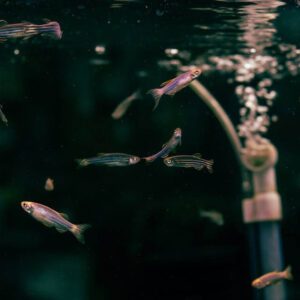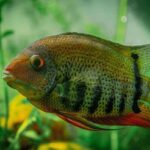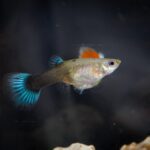Guppies are some of the most beloved freshwater fish in the aquarium hobby. Known for their dazzling colors, playful behavior, and low-maintenance care requirements, guppies bring life and charm to any tank. But one common question for aquarists is: how long do guppies live?
In this blog, we’ll explore the factors that influence guppy lifespan, what you can do to extend their lives, and the natural life cycle of these vibrant fish. By the end, you’ll have a deeper understanding of how to keep your guppies healthy and thriving for as long as possible.
1. Average Lifespan of Guppies
Under optimal conditions, guppies (Poecilia reticulata) typically live 2 to 3 years. However, their lifespan can vary significantly depending on factors like genetics, environment, and care.
Some wild guppies have shorter lifespans due to predation and environmental challenges. On the other hand, well-cared-for guppies in home aquariums can sometimes exceed three years, though this is less common.
2. Factors Affecting Guppy Lifespan
Several key factors influence how long guppies live. By understanding and controlling these factors, you can help your guppies reach their full potential lifespan.
Genetics
The genetic makeup of a guppy plays a significant role in its lifespan. Wild guppies often have stronger genetics due to natural selection, while selectively bred guppies—especially fancy varieties—may be prone to genetic weaknesses. When purchasing guppies, choose fish from reputable breeders who prioritize health over appearance.
Tank Conditions
A clean, stable environment is critical for guppy health. Poor water quality, fluctuating temperatures, or overcrowding can lead to stress and disease, shortening their lifespan.
- Tank Size: Guppies need adequate space to swim. A 10-gallon tank is a good starting point for a small group of guppies.
- Water Quality: Regular water changes and proper filtration are essential. Aim for ammonia and nitrite levels at 0 ppm, with nitrate levels below 20 ppm.
- Temperature: Guppies thrive in water temperatures between 72°F and 82°F (22°C–28°C). Sudden temperature changes can be harmful.
Diet
A balanced diet is another crucial factor in determining how long guppies live. Guppies are omnivores and require a mix of high-quality flakes or pellets, live or frozen foods (like brine shrimp and daphnia), and vegetable matter.
Overfeeding can lead to obesity and poor water quality, while underfeeding can weaken their immune system. Feed small portions 1–2 times a day and remove any uneaten food after a few minutes.
Stress Levels
Stress is a silent killer for guppies. Common stressors include:
- Aggressive tank mates
- Poor water conditions
- Sudden changes in their environment
- Overcrowding
To reduce stress, keep guppies with peaceful companions, maintain stable water conditions, and avoid sudden tank rearrangements.
3. The Guppy Life Cycle
Understanding the natural stages of a guppy’s life can help you provide better care at each phase.

Birth and Fry Stage
Guppies are livebearers, meaning they give birth to live fry rather than laying eggs. Female guppies can give birth to anywhere from 20 to 100 fry at a time, depending on their size and age.
Fry are incredibly vulnerable and require specific conditions to survive:
- A separate breeding tank or dense plant cover to protect them from adult fish.
- Crushed flake food or specialized fry food to meet their dietary needs.
- Frequent water changes to ensure clean, stable water.
Fry grow rapidly and develop their adult coloration and shape within 4–6 weeks.
Juvenile Stage
During the juvenile stage, guppies continue to grow and mature sexually. Juveniles are more resilient than fry but still require proper nutrition and stable conditions.
By 2–3 months old, most guppies are sexually mature and capable of breeding.
Adult Stage
Adult guppies are at their peak health and coloration. This is the longest stage of their life and can last 1–2 years under good conditions.
During this stage, guppies are highly active, display their full fin and body patterns, and engage in courtship behaviors.
Old Age
As guppies age, they may become less active and show signs of wear, such as frayed fins or duller coloration. Their immune systems may weaken, making them more susceptible to diseases.
Providing a calm, stress-free environment and a nutritious diet can help older guppies remain comfortable in their final months.
4. Common Causes of Early Guppy Death
Unfortunately, many guppies don’t reach their full lifespan due to preventable issues. Here are some common causes of early guppy death and how to avoid them:
1. Poor Water Quality
Ammonia, nitrite, and nitrate buildup can quickly harm guppies. Regular testing and maintenance are essential to ensure water parameters remain stable.
2. Overcrowding
Overcrowding not only stresses guppies but also leads to poor water quality. Follow the “one inch of fish per gallon” rule to prevent overcrowding.
3. Improper Diet
A lack of variety or overfeeding can lead to health issues. Offer a balanced diet and avoid overfeeding.
4. Disease and Parasites
Guppies are susceptible to diseases like ich, fin rot, and internal parasites. Quarantine new fish before adding them to your tank and treat illnesses promptly.
5. How to Extend Guppy Lifespan
While you can’t control genetics, there are several ways to maximize your guppies’ lifespan through proper care:
Provide a Clean Environment
- Use a reliable filter to maintain water quality.
- Perform weekly water changes of 20–30%.
- Keep the tank clean and free of uneaten food and debris.
Ensure Proper Nutrition
- Feed a varied diet that includes high-quality flakes, live/frozen foods, and plant-based options.
- Avoid overfeeding, as this can harm both guppies and water quality.
Choose Compatible Tank Mates
Guppies are peaceful fish that do well with similarly non-aggressive species like neon tetras, mollies, and platies. Avoid pairing them with aggressive or fin-nipping fish like bettas or barbs.
Maintain Stable Conditions
- Use a heater to maintain consistent temperatures.
- Avoid sudden changes in water chemistry.
- Provide hiding places and plants to create a stress-free environment.
Quarantine New Additions
Always quarantine new fish for at least 2 weeks before introducing them to your main tank. This helps prevent the spread of diseases.
6. Wild vs. Domesticated Guppies
Wild guppies, found in streams and rivers in South America and the Caribbean, often have shorter lifespans due to environmental pressures and predation. However, they are usually more genetically robust.
Domesticated guppies, bred for aquariums, can live longer under ideal conditions but may be more prone to genetic issues due to selective breeding.
7. Fun Facts About Guppies
- Guppies are prolific breeders: Females can store sperm for multiple pregnancies, giving birth every 4–6 weeks without mating again.
- Males are smaller than females: Male guppies are more colorful and have longer fins, while females are larger with rounder bodies.
- Guppies are hardy fish: Despite their small size, guppies are adaptable and can tolerate a range of water conditions.
- They have been to space: Guppies were part of experiments on how fish adapt to microgravity aboard spacecraft.
8. Conclusion
The lifespan of a guppy may be relatively short, but with proper care, you can ensure that your guppies live full, vibrant lives. By providing clean water, a balanced diet, and a stress-free environment, you’ll not only extend their lifespan but also enjoy the beauty and activity these charming fish bring to your aquarium.
Whether you’re a beginner or an experienced aquarist, understanding how to care for guppies will allow you to create a thriving underwater world that celebrates these fascinating creatures for years to come.






